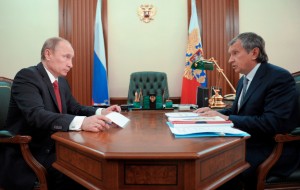

Follow us on:  
|


Russian President Vladimir Putin (l) and CEO of Rosneft, Igor Sechin. [AP]
Russian President Vladimir Putin met with the CEO of Rosneft, Igor Sechin.
The two have discussed the performance of the company that paid 1.7 trillion rubles ($56 billion) in taxes to the federal budget in 2012, contributing 12 per cent of all tax revenues and making the company the largest taxpayer in Russia, Sechin said.
“According to the results of an audit performed by DeGolyer & MacNaughton under the SEC life-of-field classification, as of 31 December, 2012 Rosneft proven hydrocarbon reserves stood at 19,026 million BOE.
“That includes oil reserves of 14,592 million bbl (1,999 million tons) and gas reserves at 26,599 billion cubic feet (753 billion cubic meters),” the company said in a statement.
It has been a good year for Rosneft which finalised important deals in 2012 to acquire the country’s third largest oil firm TNK-BP.
“Rosneft in 2012 has therefore confirmed its position as the world’s largest public oil company by proven liquid hydrocarbon reserves,” Rosneft said.
Rosneft boosted oil output by 2.7 per cent to 125.8 million tons (922 million barrels) and oil refining by 7 per cent to 61.7 million tons (452 million barrels) in 2012, Rosneft CEO Igor Sechin said at a meeting with Russian President Vladimir Putin on Tuesday.
Rosneft’s current market capitalisation stands at $92 billion but $120 billion could be a fair value given favourable market conditions and the efficient operation of the company, Sechin said.
“The year was quite successful from the viewpoint of financial indicators and some other parameters,” Sechin said.
The oil producer has repeatedly announced its plans to increase its capitalisation.
Now the goal is to reach those of Total ($124.5 bn), overtake Gazprom ($114.1 bn), and get closer to BP ($138.9 bn).
Currently the most valuable company in the sector is ExxonMobil ($413 bn), PetroChina ($264 bn), Shell ($226.1 bn), and Chevron ($224.6 bn).
Rosneft supplied 24.3 million tons of oil products to the domestic market or about 26 per cent of the total, Sechin said.
At the meeting Putin asked Sechin about the company’s relations with foreign partners.
“Currently, the company is present in the United States and Venezuela. We are working in China and getting new offers from our Norwegian partners,” said Sechin.
And that appears to be one of the priorities – the company’s work in other parts of the world aside from Russia.
The country has already shown its pivot to the East, and the energy sector is no exception.
“The Chinese gas market is of high interest to Russian exporters, as it is the fastest growing market worldwide,” Anatoly Dmitrievsky, director of the Oil and Gas Research Institute under the Russian Academy of Sciences told The BRICS Post.
Gazprom and China National Petroleum Corporation (CNPC) are in dialogue on the supply of natural gas to China, seeking to establish partnership in the energy sector.
However, there are some challenges facing Russia in this partnership.
“Russian gas will have to compete with the gas from other suppliers – Iran, Qatar, Central Asia, Australia, and probably from Myanmar, US and Canada.
“On the other hand, globalization also boosts the rivalry not only among suppliers, but the customers as well.
“Thus China will inevitably have to compete for the best offers of natural gas with India, Japan, South Korea and other countries of the Asia-Pacific Rim. And that opens wide prospects for Russian exporters,” said Dmitrievsky.
TBP with inputs from Agencies